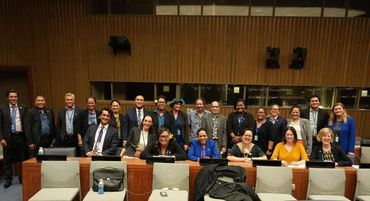The clock ran out Friday at UN talks to forge a legally binding treaty to protect open oceans beyond national jurisdictions (BBNJ), with no schedule set for prolonging the discussions.
This fourth round of negotiations since 2018 – preceded by a decade of preliminary talks – was meant to create vast marine reserves to prevent biodiversity loss, oversee industrial-scale fisheries and share out the “genetic resources” of the sea.
“We have not come to the end of our work,” said conference president Rena Lee, a diplomat from Singapore, noting that the COVID pandemic had caused major delays.
“I believe that with continued commitment, determination and dedication, we will be able to build bridges and close the remaining gaps,” she said at the end of Friday’s session.
It now rests with the United Nations General Assembly to give the green light for another round of talks.
Giving closing remarks on behalf of the Pacific, Fiji diplomat Agnes Harm said:
“Like many delegations here, we would have hoped to conclude our negotiations today, however, we remain committed to continue our collective efforts towards concluding an ambitious agreement that ensures the conservation and sustainable use of ABNJ and is based on the best available scientific information and relevant traditional knowledge of Indigenous Peoples and local communities; recognising the special circumstances of Small Island Developing States; taking into account cumulative impacts of activities, as well as of climate change, without undermining existing relevant legal instruments and frameworks and relevant global, regional and sectoral bodies; promoting transparency in decision-making
processes and other activities carried out under the agreement; recognising the importance of our role as stewards of the Ocean beyond national jurisdiction on behalf of present and future generations; and recognising the special interests and roles of coastal states, including providing adequate consideration for adjacent coastal States through mandatory consultations with them and taking their views into account as part of the entire decision-making mechanism pertaining to activities in areas beyond national jurisdiction that pose potential threat or harm or otherwise affect the national jurisdiction of a coastal State in close proximity to the proposed activities.”
“All efforts must be devoted in the coming months to secure this long-awaited treaty in 2022,” said Peggy Kalas, president of the High Seas Alliance, a coalition of more than forty major NGOs and the International Union for the Conservation of Nature (IUCN).
A so-called High Ambition Coalition of European Union nations and 13 other countries, including India, Australia, Canada and Britain, have endorsed the same goal.
Some nations and many environmental groups have called for at least 30% of the world’s oceans to be granted protected status, a target also to be on the table at UN biodiversity talks later this year.
Currently less that one percent of open ocean enjoys that status, according to the High Seas Alliance.
Oceans produce half the oxygen we breathe, regulate the weather and provide humanity’s single largest source of protein.
But they are being pushed to the brink by human activities.
Carbon dioxide emissions and global warming drive devastating marine heatwaves and acidification.
The UN’s climate science advisory body has projected that more than 99 percent of shallow water corals will die if average global temperatures rise more than degrees above preindustrial levels.
“The oceans as a whole are becoming warmer, the salinity levels are increasing. There’s less oxygen for marine life,” said Liz Karan, an expert with The Pew Charitable Trusts.
Humans have also fished some marine species to the edge of extinction, and used the world’s waters as a garbage dump.
Today, a patchwork of agreements and regulatory bodies govern shipping, fishing, and mineral extraction, while the UN Convention on the Law of the Sea, negotiated in the 1970s, lays out rules for how far a nation’s zone of influence extends beyond its shores.
But despite two decades of consultations, there is still no treaty protecting international waters beyond national jurisdiction, accounting for about two-thirds of the world’s oceans.
Another contentious question is who gets a share of the benefits from the exploitation of what are known as “marine genetic resources”.
Poorer countries fear they will be sidelined as wealthier nations scour the seas for the next wonder ingredients for the pharmaceutical, chemical or cosmetic industries, and lock up the spoils in trademarks and patents.
Will McCallum, head of oceans for Greenpeace UK, said wrapping up a deal by the end of this was crucial.
“We’re not disappointed to have a 5th session,” he told AFP. “But if a deal is not concluded in 2022 the chances of having a solid treaty are practically zero.”
“Ministers and heads of state need to step up ahead of the next round of negotiations to ensure we land the strong treaty,” he added. The treaty covers the so-called high seas, which begin beyond national exclusive economic zones that extend 200 nautical miles (370 kilometres) from their shores.
